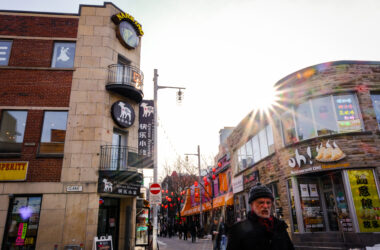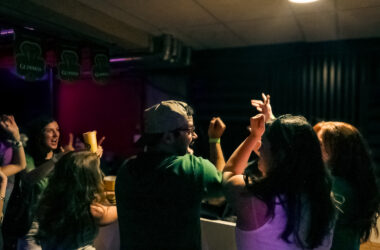The plant-filled café Le 5e in Verdun has a sweet secret: They make their non-dairy lattes and vegan fare with minimal waste. The cafe strikes a tricky balance between cool minimalism and coziness, with plants lining a bookshelf above a cozy reading nook. Co-founders Vincent Dessureault and Dorian Zéphir were both interested in cafés’ potential as places to meet and exchange information about the environment and social impact. A mutual desire to move away from careers in big business brought the pair together, and Le 5e developed after over three years of collaboration on the project.
Walking straight through Le 5e, past the kombucha on tap, leads customers to the entrance of the similarly ecologically-minded grocery store Épicerie LOCO. The sparsely-decorated space boasts everything from unusual bulk toothpaste and crickets to more pedestrian grocery finds, like bulk grain and bath products. The partnership between the café and the grocery store developed out of serendipitous timing: Le 5e’s pilot project in Griffintown concluded its trial year just as Loco’s owners decided to expand to a second location from their original outpost in Villeray.
“[At the time], we were the only two officially zero-waste companies, so we connected and kept in touch,” Dessureault said. “We ended up finding a nice place that was actually twice as big as we needed, and we [landed on] the idea of sharing the space.”.
Dessureault and Zéphir found that implementing zero-waste policies was a daunting but worthwhile task. While international chains like Starbucks have been lauded for taking small steps toward minimizing waste in their takeout options, Le 5e took more drastic steps to deliver on their zero waste promise. For one, they don’t stock paper cups and, instead, prompt customers to adopt reusable alternatives.
“The biggest challenge we have, and the most impactful decision we’ve [made], was removing all the cup waste,” Dessureault said. “With a typical coffee shop business model, [around] 50 per cent of the revenue comes from takeout.”.
Initially, getting potential customers to change their habits was a challenge, but, for every patron taken aback by the business’s decision to forego disposables, the pair saw a customer developing new habits. For those open to making the switch, Le 5e offers reusable mason jars that customers can purchase for a dollar. But, there is more going on behind the scenes of a zero-waste business than one might assume.
“The other […] challenge […] is what you don’t really see as a customer,” Dessureault said.
This includes everything from choosing the delivery containers that stock arrives in to minimizing transportation emissions. Le 5e sources local and fair trade as much as possible and is thoughtful in every step of the process to reduce waste. They have negotiated with suppliers to make deliveries in reusable containers, which they wash and send back to minimize waste produced from stocking the store. Lately, they have been doubling down on cutting transportation emissions by sourcing their stock from local suppliers that use emission-free transportation options like bike delivery.
Dessureault is made hopeful by the growth of other waste-minimizing businesses across Montreal. Thousands of Montrealers turned out to the city’s first Zero Waste Festival in 2018, and the movement has only continued to grow in the years since.
Le 5e has been connected with the Association Québécoise Zéro Déchet (AQZD), a Quebec nonprofit that aims to raise awareness among citizens, municipal governments, and businesses of the benefits of a zero-waste lifestyle. AQZD’s other partners include NousRire, a group that buys organic and ecologically-responsible food in bulk to make the products more accessible to customers and businesses, and Circuit Zéro Déchet, which compiles a directory of local zero waste businesses. Such projects, which have emerged in response to popular interest in zero-waste living, are encouraging for local trailblazers like Le 5e and Épicerie LOCO.
“They gave us a lot of opportunities to share our experiences with different people, and I think it was a nice way to connect with […] people that are curious or interested in [integrating zero waste principles] into their businesses or their future businesses,” Dessureault said.









